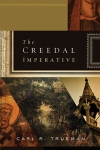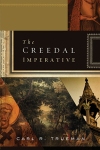 Carl R. Trueman, The Creedal Imperative (Wheaton, IL: Crossway, 2012). $16.99, 208 pages.
Carl R. Trueman, The Creedal Imperative (Wheaton, IL: Crossway, 2012). $16.99, 208 pages.
The Creedal Imperative by Carl R. Trueman presents a biblical, historical, theological, and practical case for creeds and confessions. Trueman is pastor of Cornerstone Presbyterian Church in Ambler, Pennsylvania, and the Paul Woolley Professor of Church History at nearby Westminster Theological Seminary. Though Trueman writes from a Calvinist (and complementarian) perspective, his argument can be appreciated by orthodox Christians from a variety of theological and ecclesiological traditions.
Trueman makes his argument against the frequently heard claim that Christians have no creed but the Bible. He points out that all Christian churches have a functional creed, even if they have not articulated it explicitly. Moreover, the Bible itself has creed-like formulations that in the first centuries of the church organically developed into formal statements such as the Nicene Creed and the Apostles Creed. Indeed, in some ways, those creeds are nothing but extended reflections on the biblical statement, “Jesus Christ is Lord.”
If creeds express mere Christianity, which unites all orthodox Christians, confessions expound the Christian faith for specific ecclesiastical communions. Anglicans, Lutherans, Presbyterians, and Baptists—to take four Protestant examples—affirm the Nicene Creed, but the 39 Articles, Book of Concord, Westminster Confession, and 1689 Baptist Confession parse their respective understandings of doctrine, ecclesiology, spirituality, and ethics in detail.
In the book’s concluding chapter, Trueman makes nine arguments for the usefulness of creeds and confessions:
- All churches and all Christians have creeds and confessions.
- Confessions delimit the power of the church.
- Creeds and confessions offer succinct and thorough summaries of the faith.
- They allow for appropriate discrimination between members and office-bearers.
- They reflect the ministerial authority of the church.
- They represent the maximum doctrinal competence that can be expected from a congregation.
- They relativize the present.
- They help to define one church in relation to another.
- And they are necessary for maintaining corporate unity.
The Creedal Imperative is a profoundly countercultural tract. As Trueman notes in the first chapter, contemporary culture devalues the past, distrusts words, is antiauthoritarian, and fears exclusion. By contrast, creeds and confessions value the past, use words to communicate theological truth, embody the authority of ecclesiastical communions, and draw lines between belief and unbelief. It is difficult—if not impossible—to imagine Christianity without creeds and confessions, for they are always present, if only implicitly. Far better, it seems, to make them explicit so they can be explained, defended and subscribed to!
I am an ordained Assemblies of God minister. At the founding of my fellowship, many Pentecostals were anti-creedal. Within two years of its founding, however, the fellowship found it necessary to outline a Statement of Fundamental Truths in order to clarify what the Bible taught about God, distinguish orthodoxy from heresy, and express the doctrinal basics for inclusion in the Assemblies. The Statement follows the rough outline of the creeds (Father-Son-Spirit-eschatology), but it functions confessionally. The historical experience of my fellowship confirms much of Trueman’s argument, even though there are theological and ecclesiological differences between his Presbyterianism and my Pentecostalism.
Regardless of those differences, I highly recommend The Creedal Imperative to Pentecostal readers, as well as to Christian readers who are tempted by anti-creedalism. It will challenge and inform you and, hopefully, convince you of the biblical basis and practical usefulness of creeds and confessions.
P.S. If you found this review helpful, please vote “Yes” on my Amazon.com review page.

